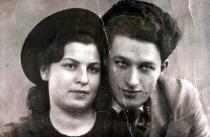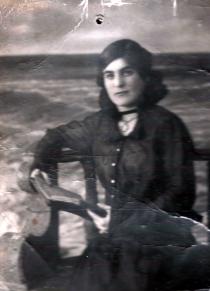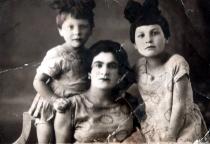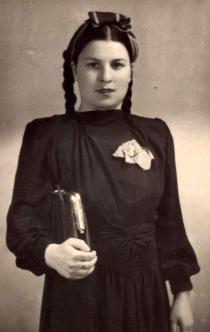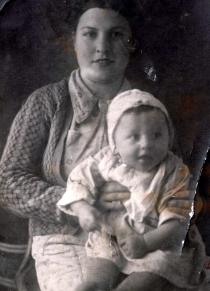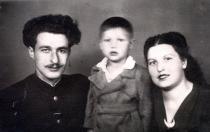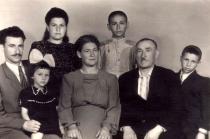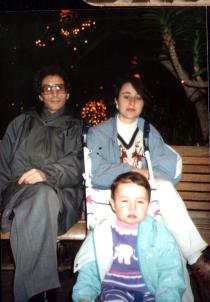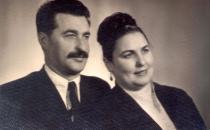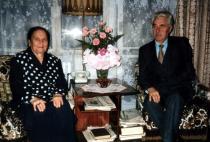This is a picture of me and my 4-month-old son Iziaslav Abidor. The photo was taken in the village of Buturlinovka, Voronezh region in 1941, to send it to my husband Grigori Abidor, who was at the front.
On the first days of the war Grigori volunteered to enter artillery school. The cadets left Odessa on foot. They went as far as Nikolaev [150 km from Odessa] where they boarded a train to go to where they were to take accelerated training. We stayed in Odessa. Our son Iziaslav was born in Odessa during the war. I went to a maternity hospital during an air raid on 9th July 1941. My mother and friends came to pick me up from hospital.
Evacuation from Odessa began at the beginning of the war, but when I started to think about it after my son was born, it was difficult to arrange for it. Germans were firing at the town, killing people in the streets. I evacuated at the end of August or beginning of September when Germans surrounded Odessa and cut off the water supply. People fetched water from a stream. We were hiding in bomb shelters most of the time. It was impossible to leave Odessa by train. I went to the regional party committee to ask them for a ticket to leave Odessa. The regional party secretary saw me holding a baby and asked, 'Kid, what do you want?' I told him that my husband was at the front and that I didn't know what to do. He gave me boat tickets for myself, my son, my mother and my sister. We managed to board the last boat to Sevastopol. I took some children's clothes and food with me.
Germans occupied Odessa on 10th October 1941. [Editor's note: Odessa fell on 16th October after a 2-month siege.] On the way to Sevastopol the boat was attacked by a German plane that dropped a firebomb. The boat caught fire, but, fortunately, its crew managed to put it out. When we arrived in Sevastopol the Germans were very close and we couldn't stay there. The boat headed on to Kerch, but the situation there was the same. There was nowhere we could get to by boat. We were taken to the railway station where we took a train to Rostov-on-Don. I was approached by a young man at the railway station in Rostov-on-the-Don. I don't know how he recognized me, but he asked me if I was the wife of Grigori Abidor. I said that I was, and he told me that Grigori was missing. The train with cadets, my husband among them, had been bombed at Marganets station. Today there's a monument honoring cadets that died in this train at Marganets station. I had no hope that my husband had survived. Later it turned out that only two railcars had been hit by bombs and that the rest of the train had remained intact.
I decided to go to Buturlinovka village, Voronezh region, in Russia. My husband's older sister Golda had graduated from Odessa Pharmaceutical Institute before the war and got a job assignment in this village. When we came to Golda's house my husband's parents were already there. They had received a letter from Grigori and told me that he was all right. We lived there for half a year until Germans began to attack Voronezh. In spring 1942 my husband's parents, Golda and her family, my mother, my sister and I moved to Tashkent, Uzbekistan [about 3,000 km from Voronezh].

